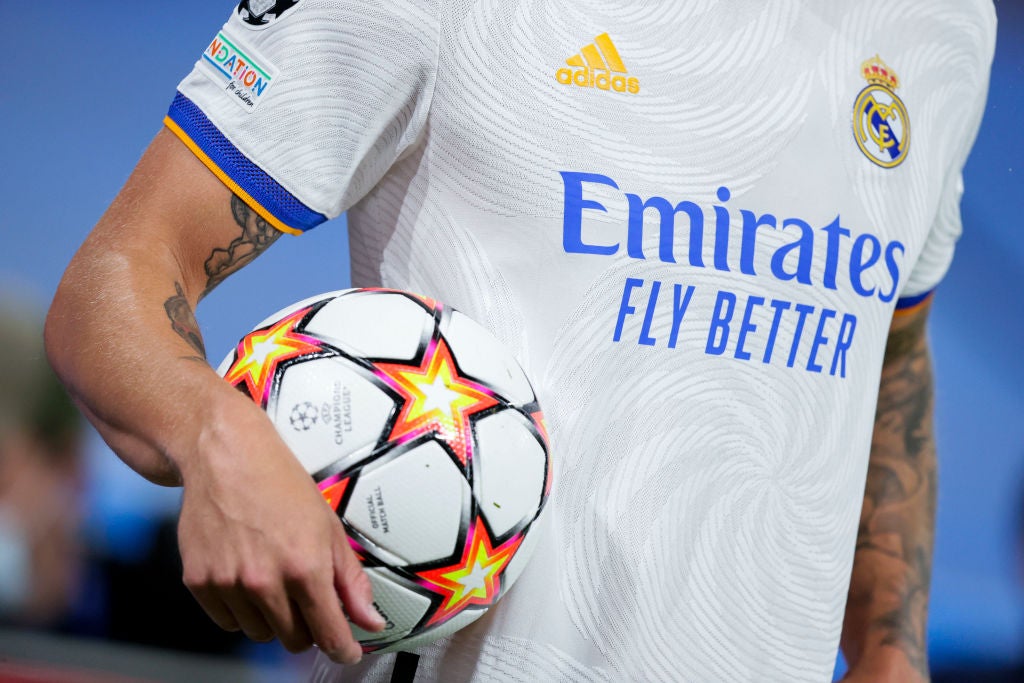
By Tariq Saleh
Clubs in Europe’s top five soccer leagues will earn a combined $1.2 billion from front-of-shirt sponsorships in the 2021-22 season, according to a new GlobalData Sport report.
The Front-of-Shirt Sponsorship: Top 15 European soccer leagues – 2021-22 report reveals that over 87 per cent of front-of-shirt revenues are directed towards the big five leagues in England, Spain, France, Germany and Italy.
Within the top European competitions, the English Premier League brings in the most money from shirt sponsorships, with the 20 top-flight clubs collectively generating £337.5 million ($446 million).
This is estimated to be over $200 million more than any other European league and is almost double the €205.5 million ($242.5 million) raked in by clubs in the German Bundesliga, the second-highest generating league.
The average value of a Premier League front-of-shirt deal is £16.7 million, while the average in Germany is just €11.4 million.

US Tariffs are shifting - will you react or anticipate?
Don’t let policy changes catch you off guard. Stay proactive with real-time data and expert analysis.
By GlobalDataDeals in Spain’s LaLiga bring in €156.3 million, compared to €149.2 million in Italy’s Serie A and €127.3 million in France’s Ligue 1.
The most lucrative agreement in soccer is the deal between Spanish heavyweights Real Madrid and Emirates Airline, valued at €70 million per year.
This is followed by French giants Paris Saint-Germain’s deal with hotel chain Accor worth around €65 million annually and English Premier League outfit Manchester United’s partnership with TeamViewer, the global technology company, valued at £47 million per annum.
Of the top 20 most valuable shirt sponsorships, the Premier League has the most with six, all of which are in the top 10.
The report, for which 235 active front-of-shirt deals were analysed, also found that, when expanded to the top 15 European leagues (based on Uefa’s country coefficient), clubs earn a combined $1.37 billion, which outlines the power of the big five.
However, the overall figure is down 4.9 per cent from $1.44 billion last season.
The average front-of-shirt deal value across the top 15 European leagues has also fallen from $6.07 million to $6.01 million.
The expanded analysis included the top leagues in the Netherlands, Portugal, Russia, Belgium, Austria and Scotland.
Liam Fox, sport analyst at GlobalData, commented: “The slight constriction in the overall value of the front-of-shirt market in the top 15 European soccer leagues can be attributed to the pandemic’s impact on the wider sponsorship market over the past 12 to 18 months.”
On the buying side of the rights, the financial hardship endured by many brands as a result of Covid-19 has seen marketing budgets slashed, while returns on investment have become more scrutinised than ever before, leading to a cooling market for premium sponsorship rights.
On the selling side, the overall package clubs have been able to offer their partners over the course of the pandemic has been devalued due to matches being played behind closed doors.
Two new front-of-shirt deals signed for the 2021-22 season that exemplify the aforementioned trends include Manchester United's loss of around £17 million per season from the value of their shirt rights in the new deal with TeamViewer.
Meanwhile, Spain’s Barcelona lost €25 million from the value of their shirt deal with Rakuten for the 2021-22 season in a deal ‘optimised’ for the post-pandemic era. The Japanese e-commerce giant has opted not to renew its deal with the Spanish club beyond this campaign.
However, the study states that with the gradual return of European soccer to its pre-pandemic state, combined with new entrants into the sponsorship market making significant investments on sponsorship rights, it is expected that this rate of decline will not continue.
The report also states that despite stricter gambling advertisement regulations becoming more widespread across Europe, the industry remains the most prevalent in European soccer’s shirt sponsorship landscape with 51 deals.
This is 18 more than any other sector and 11 more than in the 2020-21 season. Betting companies have a presence in 10 of the 15 leagues analysed and account for over 21 per cent of the total front-of-shirt agreements covered.
Fox adds: “For betting operators, shirt sponsorship is unique in that it enables it to position itself effectively in front of millions of sports fans who have direct access to their product, due to the proliferation of online and mobile betting.”
Travel and tourism brands remain the biggest investors in shirt sponsorships in European soccer, spending an estimated $330.51 million across 18 deals.
Spend is strongly bolstered by a small number of high valued deals, mainly with gulf airlines Emirates and Etihad Airways. Emirates is the most invested brand in the market across European soccer, spending $183.16 million per season across five active front-of-shirt deals – Madrid, England’s Arsenal, Italy’s AC Milan, France’s Lyon and Portugal’s Benfica.
Financial services brands have increased investments most significantly on the 2020-21 season, with deal volume increasing by 10 to a total of 33 deals across the 15 leagues analysed, whilst estimated spend has grown by 36 per cent to $283.58 million.
This has largely been attributed to the growth of fintech, crypto and non-fungible token (NFT) brands in the market for front-of-shirt rights in European soccer.



